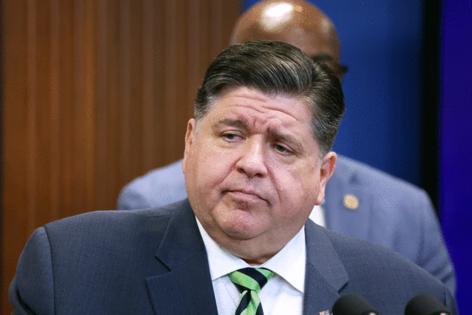Ill. Gov. JB Pritzker vows no 'broad-based' taxes to address budget hole
Published in News & Features
SPRINGFIELD, Ill. — As Illinois lawmakers continue to work on a spending plan in the final days of the spring legislative session, Gov. JB Pritzker on Wednesday offered no insight on negotiations but said he’d veto any spending plan that includes “broad-based” taxes to balance a budget that faces a shortfall estimated at $1 billion.
“I’ve been opposed to any taxes that are broad based or that would affect working families in this budget,” Pritzker said after taking part in a ceremony honoring former Republican Gov. Jim Edgar with a reading room bearing his name at the Illinois State Library. “I’ve been pretty clear with everybody that individual income taxes, corporate income taxes, sales taxes, we are not about raising those taxes at all. I would veto a bill that does that.”
Asked if he knew of any sticking points for the $55.2 billion budget proposal he presented February, Pritzker said only that he has been talking regularly to lawmakers throughout the month but offered no specifics on those talks.
Legislative leaders also have said little about where budget negotiations stand ahead of Saturday’s scheduled adjournment, but have warned about the possible need to return to Springfield because of the uncertainty over federal funding under Republican President Donald Trump’s administration.
Democrats have solid control of the General Assembly but in past years still had trouble finalizing a budget amid squabbles between progressive and moderate wings of the party. Those issues won’t be any easier to solve given Pritzker’s demand that spending be held in check during a tough financial year that was recently punctuated by a bleak report from the legislature’s Commission on Government Forecasting and Accountability. The April report showed the state’s revenue growth has fallen $471 million short of the $55 billion in state revenues Pritzker used in his February proposal.
The library event honoring Edgar emphasized his statesmanship and ability to work with both parties. Perhaps moved by that, Pritzker in his remarks to reporters stressed the importance of reaching out to the GOP — even though Republicans haven’t supported Democrat-crafted budgets in recent years.
“Even if they don’t intend to vote for a budget in the end, there are things, good ideas, I’ve often said, come from Republicans too,” Pritzker said. “And so we want to make sure that those are included.”
As with every spring session, many big-ticket items taken on by the legislature have been left for the final days of floor action.
Lawmakers filed a long-awaited bill Wednesday to reform the Chicago area’s public transportation system with changes to its overall governing structure and a new police force to patrol its bus and train lines.
The bill is a result of several public hearings over the last year, led by lawmakers, to incorporate input from organized labor, transit customers and other interests. But the bill does not include a proposal for how those reforms will be funded as Chicago-area transit agencies face an impending $771 million fiscal cliff in the coming months.
While Pritzker said he hadn’t reviewed much of the bill, he stressed the importance of whatever governance changes it calls for.
“What we really need is to uplift the entire system, make it safe for everybody to ride, get to work, go to school, get home safely,” he said. “(It’s) hyper-important to me that we’re doing that because you can’t put money into something that doesn’t guarantee that at the start.”
Legislation has also been filed to address disparities in the state’s pension system that grants greater benefits to recipients who were employed by the state prior to 2011, when changes to the massively underfunded system took effect, compared with workers hired since then.
The goal of the Tier 2 plan created 14 years ago was to shrink a pension debt that now runs to more than $140 billion. However, at some point, benefits paid out under the system won’t be equal to what Social Security would provide to those employees, a violation of a federal “safe harbor” law. This would require the state to pay large sums in Social Security taxes instead of operating its own pension system which, while still costly, allows the state more flexibility.
The Pritzker administration has proposed allocating $78 million toward addressing the Tier 2 issue, but it remained unclear if the legislation would gain any traction in the final three days of the session.
_____
©2025 Chicago Tribune. Visit chicagotribune.com. Distributed by Tribune Content Agency, LLC.







Comments